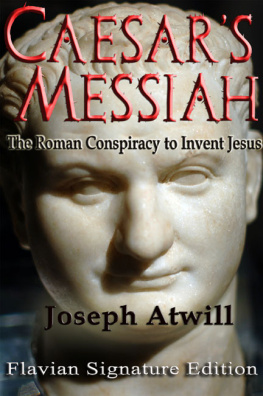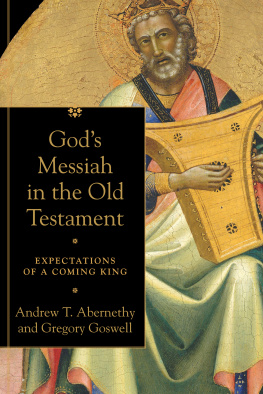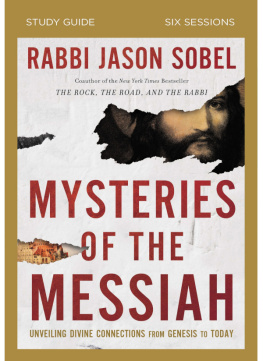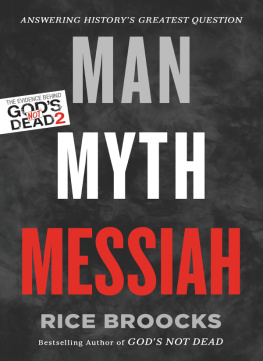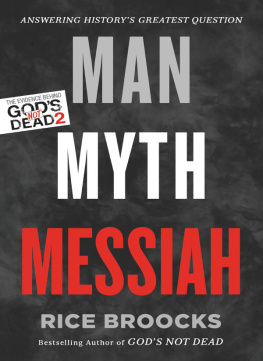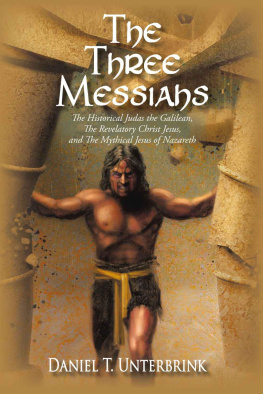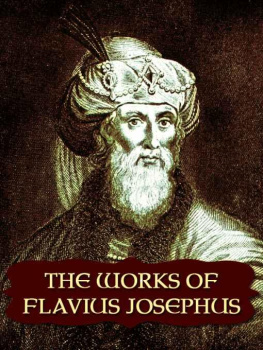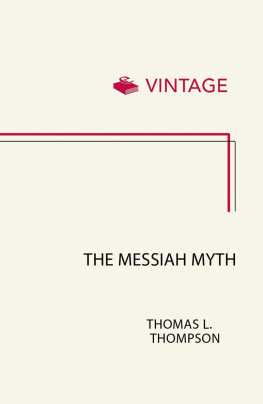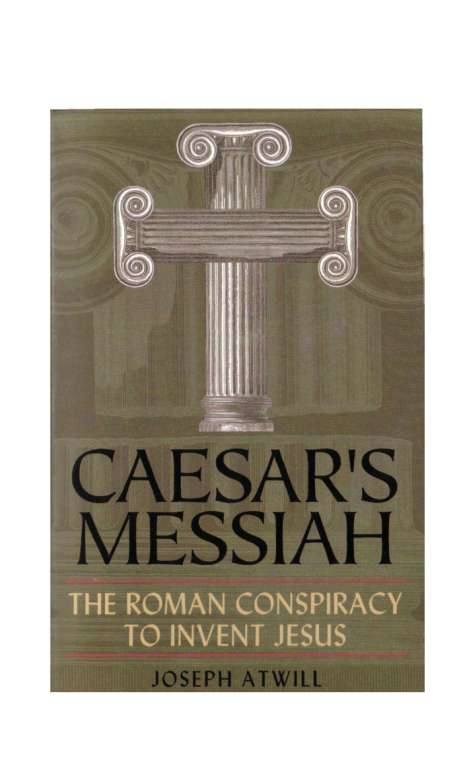Table of Contents
Introduction
Introduction
In the popular mind, and in the minds of most scholars, the origin of Christianity is clear: The religion began as a movement of the lower-class followers of a radical Jewish teacher during the first century C.E. For a number of reasons, however, I did not share this certainty. There were many gods worshiped during Jesus' era that are now seen as fictitious, and no archeological evidence of his existence has ever been found. What contributed most to my skepticism was that at the exact time when the followers of Jesus were purportedly organizing themselves into a religion that urged its members to "turn the other cheek" and to "give to Caesar what is Caesar's," another Judean sect was waging a religious war against the Romans. This sect, the Sicarii, also believed in the coming of a Messiah, but not one who advocated peace. They sought a Messiah who would lead them militarily. It seemed implausible that two diametrically opposite forms of messianic Judaism would have emerged from Judea at the same time.
This is why the Dead Sea Scrolls were of such interest to me, and I began what turned into a decade-long study of them. Like so many others, I was hoping to learn something of Christianity's origins in the 2,000-year-old documents found at Qumran.
I also began studying the other two major works from this era, the New Testament and War of the Jews by Flavius Josephus, an adopted member of the imperial family; I hoped to determine how the Scrolls related to them. While reading these two works side by side, I noticed a connection between them. Certain events from the ministry of Jesus seem to closely parallel episodes from the military
campaign of the Roman emperor Titus Flavius as he attempted to gain control of the rebellious Jews in Judea. My efforts to understand this relationship led me to uncover the amazing secret that is the subject of this book: This imperial family, the Flavians, created Christianity, and, even more incredibly, they incorporated a skillful satire of the Jews in the Gospels and War of the Jews to inform posterity of this fact.
The Flavian dynasty lasted from 69 to 96 C.E., the period when most scholars believe the Gospels were written. It consisted of three Caesars: Vespasian and his two sons, Titus and Domitian. Flavius Josephus, the adopted member of the family who wrote War of the Jews, was their official historian.
The satire they created is difficult to see. If it were otherwise, it would not have remained unnoticed for two millennia. However, as readers may judge for themselves, the path that the Flavians left for us is a clear one. All that is really needed to walk down it is an open mind. But why then has the satirical relationship between Jesus and Titus not been noticed before? This question is especially apt in light of the fact that the works that reveal their satirethe New Testament and the histories of Josephusare perhaps the most scrutinized books in literature.
The only explanation I can offer is that viewing the Gospels as satirethat is, as a literary composition (as opposed to a history) in which human folly is held up to ridiculerequires the reader to contradict a deeply ingrained belief. Once Jesus was universally established as a world-historical individual, any other possibility became, evidentially, invisible. The more we believed in Jesus as a world-historical figure, the less we were able to understand him in any other way.
To understand why the Flavians decided to create Christianity, one needs to understand the political conditions that the family faced in Judea in 74 C.E., following their defeat of the Sicarii, a movement of messianic Jews.
The process that ultimately led to the Flavians' control over Judea was part of a broader and longer struggle, that between Judaism and Hellenism. Judaism, which was based upon monotheism
Introduction 3
and faith, was simply incompatible with Hellenism, the Greek culture that promoted polytheism and rationalism.
Hellenism spread into Judea after Alexander the Great conquered the area, in 333 B.C.E. Alexander and his successors established cities throughout their empire to act as centers of commerce and administration. They set up more than 30 Greek cities within Judea itself. The people of Judea, in spite of their historical resistance to outside influences, began to incorporate certain traits of the Greek ruling class into their culture. Many Semites found it desirable, if not necessary, to speak Greek. Wealthy Jews sought a Greek education for their young men. Gymnasia introduced Jewish students to Greek myths, sports, music, and arts.
The Seleucids, descendants of Seleucus, the commander of Alexander's elite guard, gained control over the region from the Ptolemies, the descendants of another of Alexander's generals, in 200 B.C.E. When Antiochus IV (or as he preferred, Epiphanesthat is, god manifest) became the Seleucid ruler in 169 B.C.E., he began Judea's nightmare.
Antiochus was openly contemptuous of Judaism and wanted to modernize Jewish religion and culture. He installed high priests who were supportive of his policies. When a rebellion against Helleniza-tion broke out, in 168 B.C.E., Antiochus ordered his army to attack Jerusalem. Second Maccabees records the number of Jews slain in the battle as 40,000, with another 40,000 taken captive and enslaved.
Antiochus emptied the temple of its treasury, violated the holy of holies, and intensified his policy of Hellenization. He ordered the observances of the Hebrew cult be replaced with Hellenistic worship. He banned circumcision and sacrifice, instituted a monthly observance of his birthday, and placed a statue of Zeus on the Temple Mount.
In 167 B.C.E., the Maccabees, a family of religiously zealous Jews, led a revolution against Antiochus' imposition of Hellenistic customs and religions. They sought to restore to power the religion that they believed was mandated by God in his holy land. The Maccabees compelled the inhabitants of the cities they conquered to convert to Judaism. Males either permitted themselves to be circum
cised or were slain. After a 20-year struggle, the Maccabees eventually prevailed against the Seleucids. To quote 1 Maccabees, "the yoke of the Gentiles was removed from Israel" (13:41).
Though the Maccabees went on to rule Israel for more than 100 years, their kingdom was never secure. The Seleucid threat to the region was replaced by an even greater one from Rome. Roman expansionism and Hellenistic culture constantly threatened to engulf the religious state that the Maccabees had established. In 65 B.C.E., a civil war broke out between two Maccabean rivals for the throne. It was at this time that Antipater the Edomite, the wily father of Herod, appeared on the scene. Antipater helped bring about a Roman intervention in the civil war, and when Pompey sent his legate Scaurus into Judea with a Roman army, it marked the beginning of the end of the Maccabean religious state.
For the next 30 years (65-37 B.C.E.), Judea suffered through one war after another. In 40 B.C.E., the last Maccabean ruler, Mat-tathias Antigonus, seized control of the country. By this time, however, the Herodian family was firmly established as Rome's surrogate in the region and, with Roman support, defeated Mattathias' army and gained control of Judea.
Following the destruction of the Maccabean state, the Sicarii, a new movement against Roman and Herodian control, emerged. This was a movement of lower-class Jews, originally called Zealots, who continued the Maccabees' religious struggle against the control of Judea by outsiders and sought to restore "Eretz Israel."

